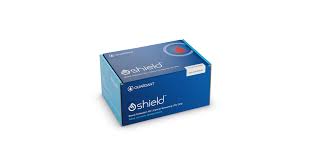Guardant Health, a leading precision oncology company, has announced that the U.S. FDA has approved its Shield blood test for colorectal cancer (CRC) screening on Monday (local time).

The approval follows a recommendation by an FDA Advisory Committee in May 2024, based on the results of the ECLIPSE study. This study, involving over 20,000 participants across 37 states, demonstrated the Shield test's 83 percent sensitivity and 90 percent specificity for CRC detection, comparable to current non-invasive methods.
The test is now approved for adults aged 45 and older who are at average risk for the disease, marking it as the first blood test to receive FDA approval as a primary screening option for CRC.
This approval allows healthcare providers to offer Shield alongside other non-invasive screening methods recommended in the guidelines. Notably, Shield also meets Medicare coverage requirements for CRC screening.
Colorectal cancer is a major health concern in the U.S., being the second leading cause of cancer-related deaths.
The American Cancer Society predicts over 150,000 new CRC cases and more than 53,000 deaths in 2024.
As a result, early detection is crucial, as the five-year survival rate is 91 percent if CRC is found early but drops to 14 percent if it has spread.
Despite its treatability, only 59 percent of eligible individuals in the U.S. undergo CRC screening, far below the National Colorectal Cancer Roundtable's target of 80 percent.
Many avoid screening due to the invasiveness or inconvenience of existing methods like colonoscopy or stool-based tests.
Dr. Daniel Chung, a gastroenterologist at Massachusetts General Hospital and Professor of Medicine at Harvard Medical School, emphasized the significance of the FDA's approval of the Shield blood test.
"The persistent gap in colorectal cancer screening rates shows that the existing screening options do not appeal to millions of people," Chung said. "The FDA's approval of the Shield blood test marks a tremendous leap forward, offering a compelling new solution to close this gap."
This decision will help make screening tests more broadly accessible and propel blood-based testing and CRC screening into a new era, Chung added.
Chung stressed that with increased screening rates and early cancer detection, many more lives can be saved.
The Shield test, developed over a decade through collaboration between Guardant Health and global health organizations, has shown high adherence rates in real-world settings, with over 90 percent of prescribed patients completing the test.
Compared to other screening methods, which have completion rates between 28 percent and 71 percent, the Shield test requires only a simple blood draw during a routine office visit, making it a convenient and less invasive option.
"The FDA approval of the Shield test is a significant victory for patients and an important milestone in Guardant Health's mission to conquer cancer with data," Guardant Health co-CEO AmirAli Talasaz said. "Shield can help improve colorectal cancer screening rates so we can detect more cancers at an early stage, when they are treatable."
The company is getting ready to launch this test soon and is very excited to empower physicians with a viable blood-based screening option to tailor the screening regimen to their patient's unique needs, Talasaz added
Dr. William M. Grady from Fred Hutchinson Cancer Center also noted the test's promise in making early CRC detection more convenient, while patient testimonials highlighted the Shield test's ease and effectiveness in real-world scenarios, illustrating its potential impact on improving screening adherence.
The Shield blood test is now available by prescription and is expected to be covered for eligible Medicare beneficiaries, with commercial insurance coverage anticipated to expand. For detailed product and safety information, visit ShieldCancerScreen.com.
Related articles
- Lunit to launch Guardant Health’s cancer diagnosis service in Korea
- Lunit wins 'CLIA certification' from Guardant Health
- Guardant Health launches blood test for colorectal cancer in Korea
- 'NGS liquid biopsy results come out faster than tissue biopsy'
- Debunking myths about colorectal cancer: expert clarifies misconceptions on constipation, polyps, and diet
- Experts call for reform to integrate innovative medical technologies in Korea

